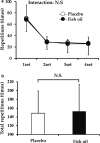Muscular endurance and muscle metabolic responses to 8 weeks of omega-3 polyunsaturated fatty acids supplementation
- PMID: 32812384
- PMCID: PMC7435031
- DOI: 10.14814/phy2.14546
Muscular endurance and muscle metabolic responses to 8 weeks of omega-3 polyunsaturated fatty acids supplementation
Abstract
Background: It has been well known that exercise training improves muscular endurance; however, whether nutritional strategies can be used to enhance muscular endurance remains unclear. Herein, we tested the hypothesis that 8 weeks of eicosapentaenoic acid (EPA) and docosahexaenoic acid (DHA) supplementation, known to promote oxygen availability and lipid metabolism, would attenuate muscular fatigue caused by numerous muscle contractions.
Methods: Nineteen healthy men were randomly assigned to a placebo group (n = 9) and fish oil group (n = 10) in a double-blind fashion. The fish oil group consumed EPA-rich fish oil that contains 600-mg EPA and 260-mg DHA per day for 8 weeks. The placebo group received matching capsules for the same duration of time. After the 8-week intervention, subjects performed muscular endurance test that was repeated knee extensions with weights equal to 40% of the subject's body weight.
Results: Maximal repetitions to exhaustion were recorded. In addition, maximum isometric voluntary muscle contraction (MVC), muscle metabolism using near-infrared spectroscopy, and blood lactate were measured during the test. Subjects in both groups reached exhaustion after the muscular endurance test, while the maximal repetitions did not differ between the groups. Similarly, there is no significant difference in oxygen saturation in muscle tissue (StO2), an index of muscle oxygen availability, between the groups. Also, MVC and blood lactate did not change between groups.
Conclusion: In conclusion, the present study provided evidence that muscle fatigue caused by knee extensions cannot be attenuated by EPA and DHA supplementation in healthy subjects.
Keywords: endurance performance; fish oil; muscle fatigue; oxygen saturation; supplementation.
© 2020 The Authors. Physiological Reports published by Wiley Periodicals LLC on behalf of The Physiological Society and the American Physiological Society.
Conflict of interest statement
No conflict of interest, financial, or otherwise are declared by the authors.
Figures




Similar articles
-
Eicosapentaenoic Acid and Medium-Chain Triacylglycerol Structured Lipid Supplementation Improves Muscular Endurance Exercise Performance and Reduces Muscle Fatigue in Young Healthy Male.J Am Nutr Assoc. 2025 Mar-Apr;44(3):190-197. doi: 10.1080/27697061.2024.2413363. Epub 2024 Oct 14. J Am Nutr Assoc. 2025. PMID: 39401344 Clinical Trial.
-
Eicosapentaenoic and docosahexaenoic acids-rich fish oil supplementation attenuates strength loss and limited joint range of motion after eccentric contractions: a randomized, double-blind, placebo-controlled, parallel-group trial.Eur J Appl Physiol. 2016 Jun;116(6):1179-88. doi: 10.1007/s00421-016-3373-3. Epub 2016 Apr 16. Eur J Appl Physiol. 2016. PMID: 27085996 Free PMC article. Clinical Trial.
-
Eicosapentaenoic Acid-Rich Fish Oil Supplementation Inhibits the Decrease in Concentric Work Output and Muscle Swelling of the Elbow Flexors.J Am Coll Nutr. 2019 Feb;38(2):125-131. doi: 10.1080/07315724.2018.1470042. Epub 2018 Sep 27. J Am Coll Nutr. 2019. PMID: 30260740 Clinical Trial.
-
Eicosapentaenoic Acid (EPA) and Docosahexaenoic Acid (DHA) in Muscle Damage and Function.Nutrients. 2018 Apr 29;10(5):552. doi: 10.3390/nu10050552. Nutrients. 2018. PMID: 29710835 Free PMC article. Review.
-
Omega-3 Fatty Acids and Maternal and Child Health: An Updated Systematic Review.Evid Rep Technol Assess (Full Rep). 2016 Oct;(224):1-826. doi: 10.23970/AHRQEPCERTA224. Evid Rep Technol Assess (Full Rep). 2016. PMID: 30307735
Cited by
-
Muscle Oximetry in Sports Science: An Updated Systematic Review.Sports Med. 2024 Apr;54(4):975-996. doi: 10.1007/s40279-023-01987-x. Epub 2024 Feb 12. Sports Med. 2024. PMID: 38345731 Free PMC article.
References
-
- Administration U. F. A. D . (2000). Letter regarding dietary supplement health claim for omega‐3 fatty acids and coro‐ nary heart disease. Docket No., 91, N‐0103.
-
- Clavel, S. , Farout, L. , Briand, M. , Briand, Y. , & Jouanel, P. (2002). Effect of endurance training and/or fish oil supplemented diet on cytoplasmic fatty acid binding protein in rat skeletal muscles and heart. European Journal of Applied Physiology, 87, 193–201. 10.1007/s00421-002-0612-6 - DOI - PubMed
Publication types
MeSH terms
Substances
LinkOut - more resources
Full Text Sources
Research Materials

